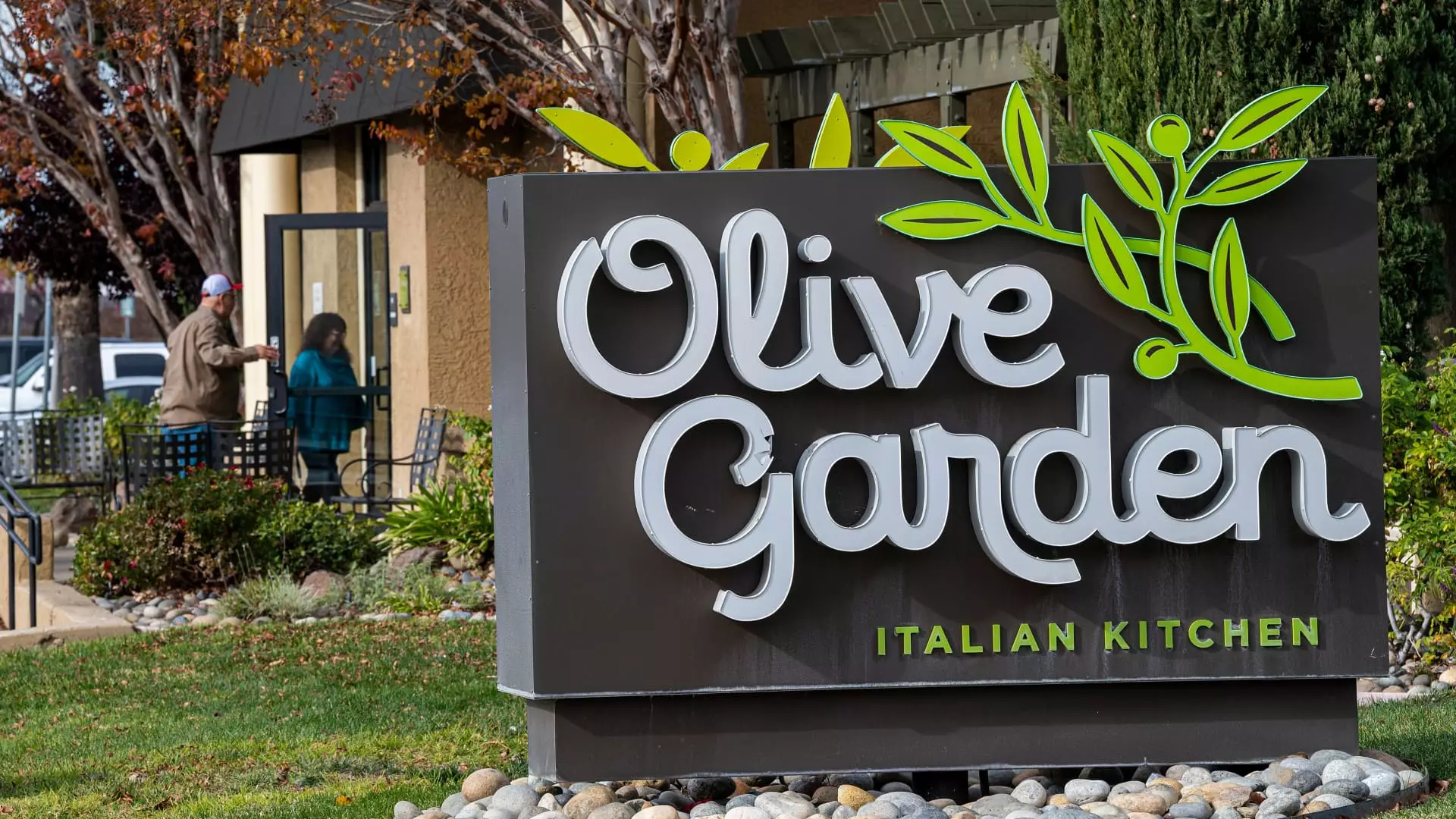In a world where many corporations grapple with fluctuating consumer confidence and rising operational costs, Darden Restaurants has emerged not just afloat but thriving, showcasing a remarkable ability to defy expectations. On Friday, the Olive Garden parent company reported quarterly earnings that surpassed Wall Street’s predictive benchmarks, consolidating its position as a resilient player in the dining sector. While the backdrop of economic uncertainty looms large, Darden’s strong financial results indicate that dining out remains a cherished indulgence for many consumers, representing an invaluable segment of discretionary spending.
Analysts may have anticipated a moderate performance, yet Darden delivered a sparkling earnings per share (EPS) of $2.98 against an expected $2.97, coupled with revenues that climbed to $3.27 billion, surpassing the predicted $3.26 billion. The company reported a net income of $303.8 million for the fiscal fourth quarter, marking a modest decline from the previous year’s $308.1 million. However, when excluding the costs associated with its notable acquisition of Chuy’s Tex Mex, the numbers reflect a healthier bottom line, showcasing the strategic foresight employed by Darden’s leadership.
The Impact of Strategic Acquisitions
Darden’s success is no coincidence; it is the product of deliberate decisions and strategic acquisitions, which have turbocharged revenue streams. The acquisition of 103 Chuy’s restaurants played a pivotal role in the business’s 10.6% increase in net sales, driving a more nuanced engagement with diverse consumer preferences. This multifaceted approach is crucial in an era where dining preferences shift rapidly due to changing demographics and economic conditions.
As the Orlando-based company steadily grows its reach, it’s fascinating to observe how its flagship brands, including Olive Garden and LongHorn Steakhouse, capitalized on this trajectory. Olive Garden, which alone contributes roughly 40% of Darden’s revenue, reported a striking 6.9% rise in same-store sales, leaving analysts astounded. Meanwhile, LongHorn Steakhouse performed even better, with a sales growth of 6.7%. Such results underscore the importance of catering to existing customers while also enticing new ones; they evoke the feeling of familiarity while offering something new to explore.
The Dark Side of Dining Out
Nevertheless, one mustn’t ignore the sector’s potential pitfalls. The fine dining segment—a crucial aspect of Darden’s portfolio—suffered a 3.3% decline in same-store sales, starkly contrasting with analyst expectations. This disappointment highlights an alarming trend: as consumers face mounting economic pressures, they may opt for experience over luxury. If Darden wishes to maintain its stronghold in the dining landscape, it must adapt its fine dining offerings to be more accessible while retaining an air of exclusivity.
Additionally, despite a burgeoning market, there are signs indicating that consumers are scaling back on non-essential spending. CEO Rick Cardenas has maintained an optimistic outlook, asserting that dining out continues to be a rewarding experience for those looking to indulge. However, the sustainability of this mindset warrants scrutiny; a more cautious consumer base might challenge this narrative in the coming quarters. What will Darden do if their beloved Olive Garden fails to thrive in an increasingly frugal market?
Looking Ahead: Caution and Confidence
As Darden unveils its forecast for fiscal year 2026, the projected revenue growth of 7% to 8% appears promising—yet ambitious. The addition of an extra operational week contributes approximately 2% to this expected growth, exposing what could be perceived as a safety net. While optimism over consumer habits fuels Darden’s projections, the realities of market unpredictability remain stark. The implementation of on-demand delivery through partnerships with platforms like Uber Direct is a commendable strategy to adapt to modern consumer behavior; however, it must be pursued with care and precision to avert potential pitfalls.
The announcement of a $1 billion share repurchase program signals a commitment to returning value to shareholders. Still, the decision raises questions about the prioritization of immediate shareholder interests over long-term investment in operational improvements. Will the allure of short-term gains overshadow the critical need for enhancement in areas like customer experience and innovation?
In a rapidly evolving marketplace, where consumer preferences shift as quickly as economic circumstances, companies must constantly reevaluate how they engage their customer base. Darden Restaurants currently rides a wave of triumph, but as the past has taught us, those waves can recede just as swiftly, warranting caution amid optimism.

